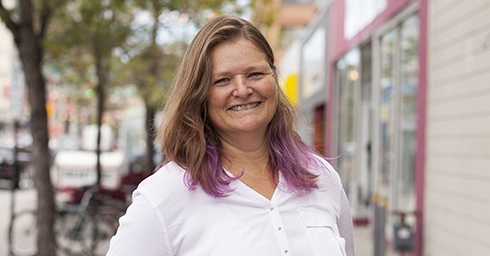News and Releases

Faculty Profiles
Faculty: In Their Own Words – Karen Ridd
Thursday, May 3, 2018 @ 9:00 AM | Faculty Profiles
Karen Ridd has been a lecturer in Conflict Resolution Studies at MSC since 2007. Karen is a mediator, facilitator, teacher and public speaker with over 25 years of experience as a conflict resolution practitioner, including work as a human rights volunteer in war zones in Central America with Peace Brigades International in the 1980s.
What do you love about your work at here?
I love a lot of things about working here. The first one would be the students. I am continuously inspired by students in my classroom – every single day. I have this vision of millennials as these amazing wonderful passionate people who are concerned about the world—and I get to live in the world with them. I also get to work with fantastic colleagues who care about the world, and care about their students. I get to teach interesting material, and learn interesting things. I love my job!
What are you teaching right now that you're most excited about?
One of the courses I'm teaching right now is Nonviolent Action for Social Change. I really love that course because it attracts people who are interested in creating a world that's better, more accessible for people, more just, and more fair. And it attracts people who have no idea what they're getting into. And yet they're here, and they're exploring it. It's a very hands-on course. Students carry out a group project where they choose an issue that they're passionate about, and then they go and do something about it. These projects have had an impact on the city of Winnipeg, on various different issues - sometimes they even end up on national television. The students are making a real difference, so that's exciting.
What you are reading for enjoyment?
Right now I'm reading a book called Shattered by Melissa Moore. She's the daughter of a serial killer. Of course I'm reading it because it will be useful in the restorative justice course I'm teaching in the spring. It's helping me understand when crime happens, when harm happens, who are the people who are hurt and what are those ripple effects. But I also find it really fascinating.
Where or how do students give you hope?
Students give me hope by their openness to learning new ideas, and their desire for growth. For example, they may have thought that nonviolent action was naive or ineffective, but now they realize that it might not be. To be willing to let something go and grasp something new, I find that I inspiring.
Also, every year the demographic shifts here at MSC, and I'm incredibly moved by the surge of Indigenous students. They're bringing strong voices, passion, and a sense of urgency to the classroom. They're pushing us all, and I find that incredibly moving and inspiring.
What do you most long for in your work?
This has been a hard term. There was the decision in Saskatchewan about the murder of Colton Boushie, and there was the decision in Winnipeg about the murder of Tina Fontaine. I've felt so heavily the weight of that pain on indigenous communities, and on students in my classroom who deeply experience that as "Our children, our Indigenous young people don't matter. They're expendable." Of course, that's not a new experience for Indigenous communities to feel that way. They've been feeling that way since contact. But there's a particular way it's being felt now.
There's this weird thing about privilege. As a white, middle-class, heterosexual, cis-gendered academic, all these ways that I have privilege, I don't need to feel that pain. And yet, my privilege requires me to be accountable, to feel the pain, and to take action for justice. So if you're asking me what I'm longing for—I'm longing for justice. I'm longing for a Canada in which all people legitimately have the same opportunities where nobody is afraid that they could be seen as expendable; where no one falls through our nets; where no one gets lost. We're not there, and that's hard.
Do you have any interesting projects underway in the broader community or church?
About a year ago, I moved from rural Manitoba to the city, and that has opened up more time for me to be involved in a number of new things. One of things I do is sing in a comfort choir. These are folks who bring the gift of music to the bedsides of people who are dying, and to their families. I'm really interested in end-of-life matters. I've been around at peoples' passing and been helpful in that process on a number of occasions. It seems to be something that I get drawn to.
I'm also interested in finding ways to be more involved in supporting Indigenous folks working for justice, so I'm involved with a group of Settlers who would like to be allies. We're trying to figure out what are the best things that we can be doing. That's probably the thing I'm most involved with.
What saying or motto inspires you?
There's a saying that I include in my email signature. It's attributed to Gandhi, but it might be apocryphal. The saying is, "What you do may be insignificant, but it's very significant that you do it." For me that's important because it's really easy to feel the overwhelmingness of issues facing us—global warming, Donald Trump, Indigenous injustice—that it's just too much. I have to remind myself that my job is to just keep chipping away at what I can, that it's important that I do that. And to some extent, I need to trust that the Universe will unfold as it should. I just need to keep picking away at my part.
KEYWORDS: Karen Ridd, Nonviolent Action for Social Change, faculty profile, conflict resolution, faculty, Faculty In Their Own Words


 Print This Article
Print This Article